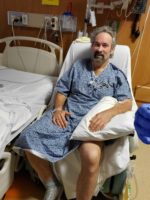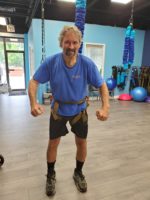Written by Erin Dailey
Kevin Underriner of Dover struggled with high blood pressure for the majority of his life and was on and off medication under his doctor’s guidance. Underriner married a Canadian in February of 2019, but had yet to emigrate before COVID hit. In February 2020 he left for Canada before the borders were locked and in May, his emigration status allowed a border crossing, so he returned to the States to finish some work. Three weeks later, while on a video call with his wife, he began to feel extremely tired. One minute he was having a conversation, and the next, he was unconscious on the ground.
Underriner’s wife immediately called their neighbors in the States for help, and they were able to call 911 and attend to him. His wife works for the Ontario Ministry of Health. Being well versed with F.A.S.T. to recognize strokes, she saw his face droop, heard his speech slur, and instructed him to lie down, but Underriner does not remember any of that or being taken to the hospital. At the hospital, he learned that he suffered a 3 cm lesion in the left basal ganglia and that his carotid artery had essentially burst open. He was completely hemiplegic and did not have any movement on the right side of his body.
He had to relearn to eat as half of his mouth and tongue were numb. He is still not completely back to normal, but he has about 95% of feeling back in his mouth. There were few cognitive effects from his stroke, but he did have memory issues where he could not remember names of nieces or nephews, but luckily, that came back rather quickly. However, he was crossed-eyed for the better part of two months. Underriner explains how one of the worst side effects from the stroke was the paranoia. The doctors explain that it is not unusual to feel paranoia after a stroke, especially for a right-handed person who had a stroke in the left part of their brain.
The 3 cm lesion stroke that Underriner suffered from is 98% fatal and 95% of people who survive it require a craniotomy. “I managed to avoid both, and when you look at the image of the MRI they did initially, it looks like I took a shotgun blast to the head,” Underriner explained. He credits the fact that he was able to get to the hospital within 15 minutes of having the stroke to not having worse consequences.
 Underriner went back and forth to hospitals between Canada and the States, but in May of 2021, he returned to the States for good. When he left the hospital, they told him that he would be wheelchair bound for life, but he is walking with a cane today and hopes to be walking on his own soon. He continues to notice improvements every day with simple tasks that used to be impossible for him, such as picking things up off the ground while standing.
Underriner went back and forth to hospitals between Canada and the States, but in May of 2021, he returned to the States for good. When he left the hospital, they told him that he would be wheelchair bound for life, but he is walking with a cane today and hopes to be walking on his own soon. He continues to notice improvements every day with simple tasks that used to be impossible for him, such as picking things up off the ground while standing.
He sets goals for himself to achieve and hopes that by the time he is 60, he can hike the Appalachian Trial and complete a mini-marathon. He continues to work extremely hard with physical therapy and rehab to get stronger and he refuses to accept that the stroke determined his fate for the rest of his life. He fights to regain movement and stability and is a powerful example of not letting fear and people telling him he will not be active again stop him. He will never give up hope.
The biggest message that Underriner wants to send is the term of blood pressure being a “silent killer.” He knew he had high blood pressure all his life that had to be managed, but the term silent killer never compelled him to stay on top of it. He was not taking the blood pressure medication when he had the stroke, which was the root cause. He believes that the message needs to be stronger and more effective, because strokes from high blood pressure, which he had, are largely preventable. The messages need to get to the heart and the head and have examples showing how strokes are life changing for everyone involved.
He feels not managing blood pressure is a selfish act because strokes may affect loved ones even harder than they do the person who suffers a stroke, as loved ones often become their long-term caregivers. “The one thing I want to communicate to people is not to take care of blood pressure for yourself, but do it for your friends and family because if something were to happen, you can lose that. The people in your life who know you one way suddenly must redefine relationships and you will lose some as well,” stated Underriner.
For more information about how to lower your blood pressure and prevent a stroke, visit here.